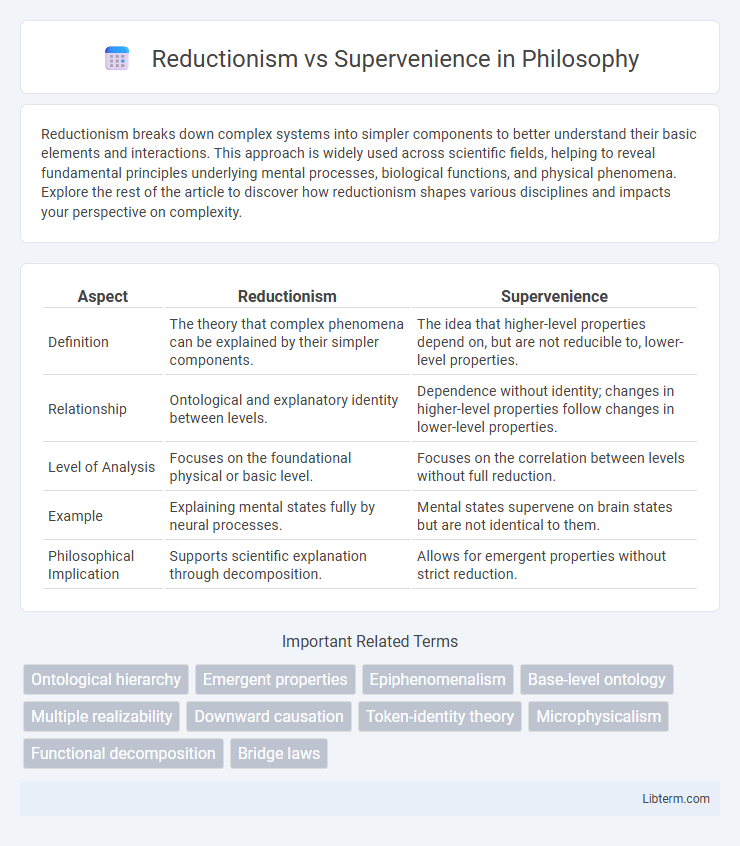Reductionism breaks down complex systems into simpler components to better understand their basic elements and interactions. This approach is widely used across scientific fields, helping to reveal fundamental principles underlying mental processes, biological functions, and physical phenomena. Explore the rest of the article to discover how reductionism shapes various disciplines and impacts your perspective on complexity.
Table of Comparison
| Aspect | Reductionism | Supervenience |
|---|---|---|
| Definition | The theory that complex phenomena can be explained by their simpler components. | The idea that higher-level properties depend on, but are not reducible to, lower-level properties. |
| Relationship | Ontological and explanatory identity between levels. | Dependence without identity; changes in higher-level properties follow changes in lower-level properties. |
| Level of Analysis | Focuses on the foundational physical or basic level. | Focuses on the correlation between levels without full reduction. |
| Example | Explaining mental states fully by neural processes. | Mental states supervene on brain states but are not identical to them. |
| Philosophical Implication | Supports scientific explanation through decomposition. | Allows for emergent properties without strict reduction. |
Introduction to Reductionism and Supervenience
Reductionism explains complex phenomena by breaking them down into simpler components, emphasizing that all higher-level properties can be fully explained by lower-level physical states. Supervenience, on the other hand, describes a dependency relation where higher-level properties depend on lower-level properties but are not reducible to them, ensuring no change in supervenient properties without a change in subvenient properties. Both concepts are foundational in philosophy of mind and metaphysics, addressing how mental states relate to physical states.
Defining Reductionism in Philosophy
Reductionism in philosophy asserts that complex phenomena can be fully explained by the interactions of their simpler, more fundamental components, often grounding mental states in physical processes. This approach emphasizes hierarchical structures where higher-level properties are dependent on, and reducible to, lower-level entities. Philosophical reductionism contrasts with supervenience by insisting on explanatory and ontological dependence rather than mere correlation between levels of properties.
The Concept of Supervenience Explained
Supervenience describes a relationship where the properties of one set depend systematically on the properties of another set, such that no change can occur in the supervenient properties without a corresponding change in the subvenient properties. Unlike reductionism, which seeks to explain higher-level phenomena entirely in terms of lower-level components, supervenience allows for higher-level properties to be dependent on but not reducible to lower-level properties. This concept is pivotal in philosophy of mind and metaphysics, clarifying how mental states correspond to physical states without implying a straightforward reductive explanation.
Historical Context: Evolution of Both Theories
Reductionism emerged prominently in the 17th century with the scientific revolution, emphasizing the analysis of complex phenomena by breaking them into simpler components, as seen in Descartes' mechanistic philosophy. Supervenience developed later in the 20th century within analytic philosophy, addressing challenges to reductionism by positing that higher-level properties depend systematically on lower-level bases without being reducible to them. The evolution of both theories reflects ongoing debates about the relationships between mind and body, science and metaphysics, influencing contemporary discussions in philosophy of mind and cognitive science.
Key Differences Between Reductionism and Supervenience
Reductionism asserts that complex phenomena can be fully explained by their basic components, emphasizing a hierarchical structure from micro to macro levels. Supervenience posits a dependency relation where higher-level properties rely on lower-level bases without being reducible to them, maintaining that no change occurs in the supervenient properties without a change in the base properties. The key difference lies in reductionism's commitment to explanation through identity or at least full derivation, whereas supervenience allows for dependents without necessitating reductive explanation.
Reductionism in Science and Mind
Reductionism in science and mind emphasizes explaining complex phenomena by breaking them down into their simplest components, such as biological processes for mental states. This approach supports the idea that mental states are fully reducible to physical brain states, allowing for precise, testable scientific theories about consciousness and cognition. Through reductionism, interdisciplinary research links neuroscience, psychology, and molecular biology to uncover fundamental mechanisms underlying thought and behavior.
Supervenience in the Philosophy of Mind
Supervenience in the philosophy of mind describes the dependence of mental states on physical states, where any change in mental properties necessarily corresponds to a change in the underlying physical substrate. Unlike reductionism, which seeks to explain mental phenomena solely through physical processes, supervenience asserts a non-reductive dependence, maintaining mental properties as emergent yet systematically tied to physical properties. This relationship supports theories that accommodate the complexity of consciousness without reducing it entirely to neurobiological components.
Major Critiques of Reductionism
Major critiques of reductionism highlight its oversimplification of complex phenomena by ignoring emergent properties that cannot be fully explained by lower-level components. Critics argue that reductionism fails to account for the causal powers and autonomy of higher-level structures, such as mental states or social systems. This limitation underscores the importance of supervenience, where higher-level properties depend on but are not reducible to underlying physical states.
Challenges and Debates Around Supervenience
Supervenience faces challenges surrounding its explanatory power in accounting for the dependence of higher-level properties on lower-level bases without reduction. Critics argue that supervenience relations often lack causal mechanisms, making it difficult to clarify how mental states arise from physical substrates. Debates continue over whether supervenience can adequately address issues of multiple realizability and the ontological status of emergent properties.
Future Directions: Integrating Reductionism and Supervenience
Future directions in philosophy of mind emphasize integrating reductionism and supervenience to create a more comprehensive framework for understanding mental states. This approach seeks to reconcile reductionism's focus on underlying physical processes with supervenience's emphasis on the dependence of mental properties on physical substrates, promoting interdisciplinary research combining neuroscience, cognitive science, and metaphysics. Advancements in computational modeling and neuroimaging technologies are expected to drive empirical studies that clarify how mental phenomena emerge from physical systems while preserving supervenient dependencies.
Reductionism Infographic

 libterm.com
libterm.com